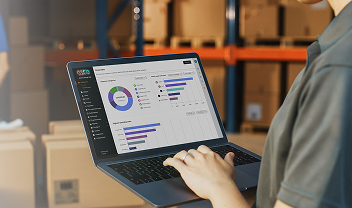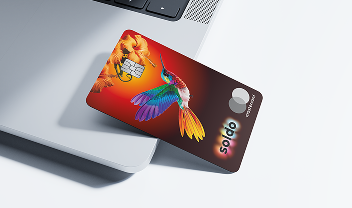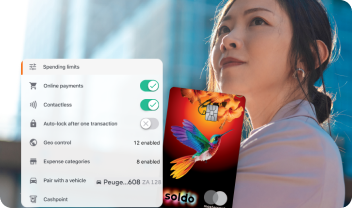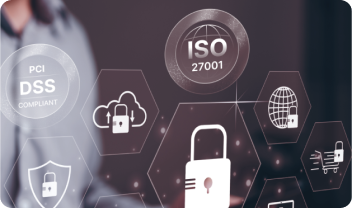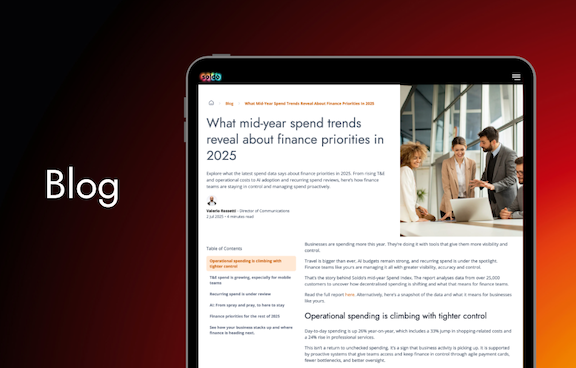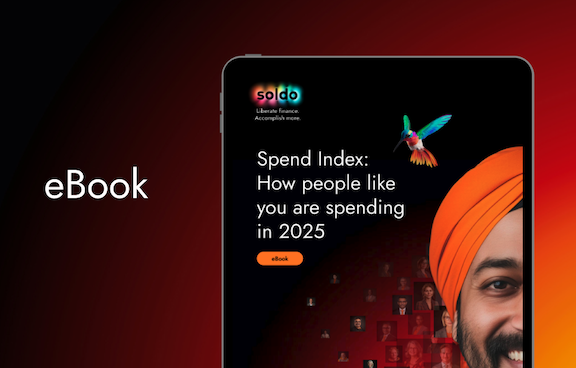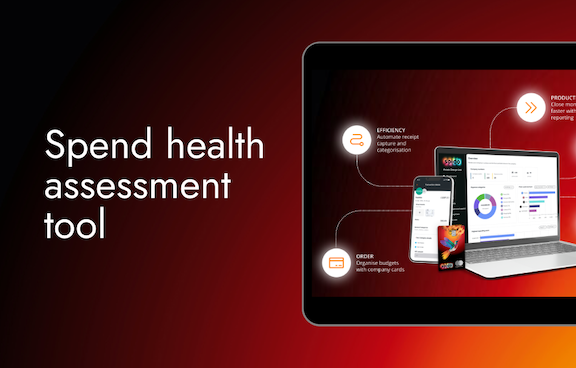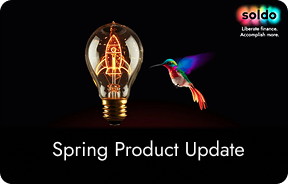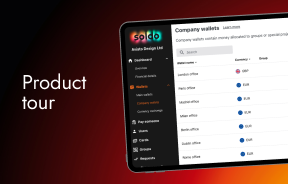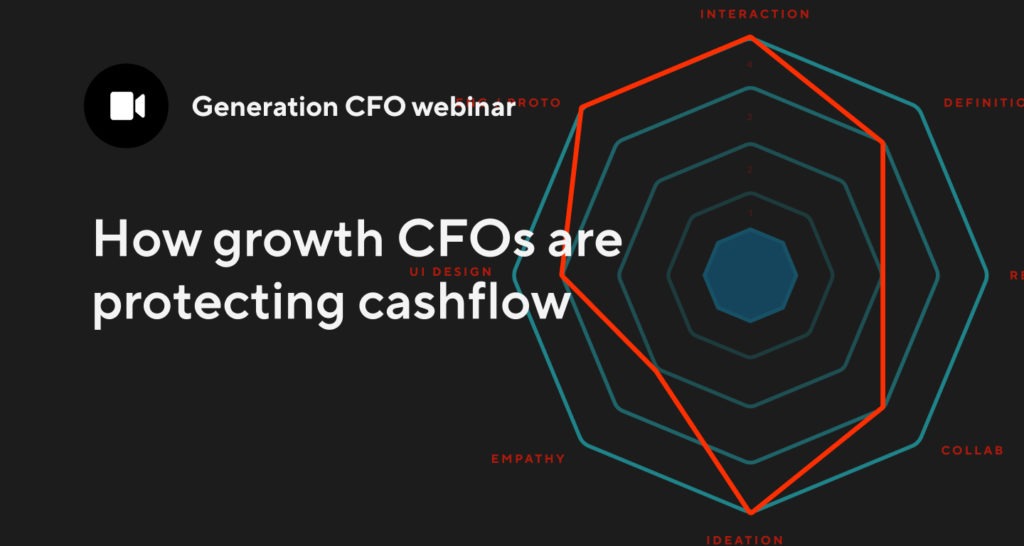CFOs are the sworn protectors of their businesses’ cash flow, even more so during crises. Listen to finance experts Dynshaw Italia and Christopher Argent to learn how to protect cash flow to the best of your abilities.
What you will learn
During the live CFO Debate on 5th May 2020, Daniele and Mark discussed:
🧭 How CFOs can help companies successfully navigate the coronavirus crisis
📈 The importance of cash flow forecasting and its difficulties Methods for quickly getting on top of spend (such as Zero-Based Budgeting)
🔍 Innovative ways to manage and track spend
💰 How to distribute funds rapidly in the current climate
ABOUT THE SPEAKERS
Dynshaw Italia
CFO at Soldo
Dynshaw has over 20 years’ experience working with fast-growing brands and has worked for Cobra, Lebara and CreditEnable. His specialities include building finance functions to deal with fast-growth, scaling operations and maximising working capital.
Christopher Argent
Generation CFO
Christopher Argent runs the Generation CFO community. He works with CFOs and teams to lead change & benefit from the digital transformation opportunity.
Summary
The ‘New Normal’
The past year has foiled most of our plans and scrambled our priorities, revealing the common crucial need of the “new normal”: cash preservation
CFOs have had to assume control of the situation by controlling and monitoring costs and reforecasting repeatedly for what feels like an eternity.
The whole environment has changed and is still changing fast. Teams are learning to become agile to adapt to their new surroundings. The new conditions, unsurprisingly, present a number of challenges. But even in uncharted waters, there are some general guidelines that businesses can follow to keep afloat and weather the storm.
Keep reading to find out what the experts recommend when protecting cash flow in times of crisis.
Protect your ecosystem
The success of your business has a few drivers, including, most importantly, your suppliers and your customers.
You had these before the crisis, you (hopefully) have them during the crisis, and you will continue to have them after the crisis. Or rather, you have to work to keep them through the crisis.
It can be tempting to not pay suppliers. Instead, renegotiate and pay a lower amount so it doesn’t weigh on your pockets, while also giving them the resources to survive themselves.
Your customers are also going through the crisis with challenges of their own. Find a way to protect customers while getting cash quickly. For example, you could start offering customers credit card payment options.
They get to pay on credit and you get the cash instantly – everyone’s a winner!
But what if the problem doesn’t lie in their wallets?
Look at new sources of revenue
Customer priorities have changed. They don’t spend on what they used to spend on.
The only solution is to open new revenue streams by finding new use cases. Soldo, for example, relied on travel and entertainment expenditure. But no one travels anymore. As Dynshaw says, if they had relied on that, they would have 10% of their revenue today.
So, they identified what people are spending on today. They asked themselves, in terms of the crisis, if there was any part of their product or service that could help people or the government, what would it be.
Soldo found their new use case with the Municipality of Milan, who could use the Soldo card to:
- empower citizens with cards instead of food vouchers;
- send a weekly allowance to avoid overspending;
- top up the cards instead of continuously distributing food vouchers.
Of course, this may seem difficult to a large company. But the truth is, compared to growing companies, larger companies have more time to think.
Start from scratch
Zero-based budgeting. We all have to do it and we all have to start from scratch.
It forces you to relook at contracts that you may have in place that you should renegotiate out of, subscriptions that you were not aware of, and other commitments that are causing you to bleed money.
But when you do zero-based budgeting and forecasting, you have to have a benchmark of historical costs that you’ve incurred. Otherwise, you’ll risk missing costs that you’ve committed to in the past.
You need the right data granularity that offers a clear view of past spending to employ rapid and rigorous spend control.
Make use of current tools
Finance teams need to engage with technology.
Although technology can add value to the entire business, there are, according to Dynshaw, three key areas where we must use technology:
- Automation – which is fundamental when you scale a business;
- Availability of data – how do you capture data and extract the right insights;
- Real-time information – the data you capture and analyse has to be the most recent to make quick decisions.
Technology saves time. The finance team can avoid reconciliations, chasing people for receipts, trying to allocate expenses to the right category and matching the invoices you got from Google!
This all allows finance teams to spend more time on value-added processes and, ultimately, empowers them to positively impact other areas of the business.
Conclusion
CFOs are the sworn protectors of their businesses’ cash flow. Their roles have and still are evolving rapidly. CFOs must:
- Protect the members of their ecosystem, those with whom they will continue to do business after the crisis.
- Use their creativity to unlock new revenue streams.
- Get a clear view of historical spend data and plan the budget from scratch.
- Harness new technologies, which are simply the tools that will make your job easier and more efficient.
Transcript
Christopher Argent 00:01
Right well let’s begin. So, hello and welcome to the CFO debate live. My name is Christopher Argent, founder of Generation CFO. We aim to support the much-needed debate around the future of the CFO and the finance function and the impact brought about by new talent and technology.
Just a bit of housekeeping. You can move your screen around, there’s a presentation view where you see the presentation and the speaker view where you can focus on the speakers. And obviously you can see myself and Dynshaw at the moment. We’re trying to keep this as engaged as possible so if you look at your control panel there is a Q&A box where you can ask questions as we go and I will try to bring them in at the relevant time. And you can raise your hand to flag that you have asked a question.
We’ll be having a few polls as we go through as well. It will be good to get a consensus of what everybody’s going through at the moment, not just our points of view. So, enjoy the show.
01:17
Today we’re joined by the CFO of Soldo, Dynshaw Italia, who is in an exclusive position of being both the finance leader of this company but also the user of his company’s products, as Soldo is a spend and expenses management platform complete with its own mastercard cards. So Dynshaw iss able to give us a unique perspective on how tech can enable CFOs during the covid crisis, so good morning Dynshaw.
Dynshaw Italia 01:52
Good morning Christopher, hi.
Chris 01:55
How are you doing today?
Dynshaw 01:57
Very well thank you.
Christopher 01:58
And where are you in the world, because we’ve got a few people from around the country, are you in the UK?
Dynshaw 02:06
I’m in London at the moment, North West London in my house, preserving the lockdown situation.
Christopher 02:13
Absolutely, it’s a tricky one for everybody, but I think we’re all going through the same thing and that’s where I wanted to start actually. From your perspective, let’s jump straight in and talk about your current priorities, from your perspective as a growth CFO. What are the things that are bubbling to the top for you? Maybe over the past few weeks but also as we realise that this is probably going to continue for a while.
Dynshaw 02:47
So, I think the preservation of cash is probably the most fundamental thing that we are looking at. And when you look at the preservation of cash, you go down to cost control, streamlining of costs, you look at stronger monitoring and control of spend, you also have to look at budgeting and forecasting, that’s something you have to look at because the whole environment has changed. I’m trying to look at other sources of funding, the government is providing some good loan options, it’s looking at obviously furlough options, deferment of VAT and PAYE.
03:29
Obviously look at employees. You’ve got to look after your employees, at the same time you can make use of the government schemes. In these sorts of situations what you also have to look at is can you pivot your business and look at new sources of revenue, because maybe your existing sources of revenue are falling apart.
So we’re looking at new use cases, new geographical markets where they’re opening up earlier than the UK. Of course you have to deal with customers, suppliers, and planning for the new normal as well, because things are going to change.
Christopher 04:04
It sounds like a very similar set of priorities for a lot of people, but I think there’s one thing I’d like to pick up on, which is pivoting during this time. Generation CFO has a broad kind of audience and you’re in a growth company, do you feel that you’re able to pivot, are your priorities maybe different to some of the more established companies? Because we talk a lot about agility and trying to be a bit more agile but…
Dynshaw 04:40
But you have to be. If you look at our business, for example, one of our use cases was using our card for travel & expenditure. Now T&E has gone down to more or less to 1/10 of the level it was before. If we only were to rely on T&E we would have 10% of our revenue today. So you have to look at what are the use cases, what are people spending on today. Is it still shopping, is it still in those areas? What’s happening in terms of the crisis, can we help the governments use our technology so that they can control spend that they are giving to people for food or for their first responders?
So it’s always thinking about how I can actually generate revenue from other sources. Because if you stand still, you won’t survive. And I’ve seen this in startups. Fortunately, I’ve been the CFO of startups to scale businesses throughout my career. And one thing I have learned is you just can’t stand still. That’s the one big difference, you have to keep innovating, you have to keep adapting.
Christopher 05:54
And do you think growth companies have an advantage compared to larger companies where maybe their governance is more fixed or their processes are fixed because of the larger operation? Or is it just more of a mindset thing that we need to be a bit more entrepreneurial in our CFO positions?
Dynshaw 06:24
I think there is a mindset thing and I think also the situation demands that you have to be flexible. So in a growth company, things are changing so fast. If I give you an analogy: think of an F1 race where somebody’s coming in to change their tyres. A pit stop. There’s so much that you need to look at in terms of when you change it, how long it’s going to take to change. That’s what a normal CFO would look like.
07:01
But in a growth CFO, you have to change that tyre when you’re going 100 mph. Because things are just thrown at you, every day is different. And I’m sure people here would understand that you get up in the morning and there’s a new challenge. And one of the big differences that I see and face is: in a growth phase we can’t be too proactive, we are more reactive to things that are happening. That’s one big difference. If you’re in an established business you probably have time to think and can be more proactive, in a growth business it’s just pure reaction to challenges that are thrown at you.
Christopher 07:43
Yeah and I suppose that no one could plan for this and say “be reactive”. If you’ve got a continuity plan then fantastic, but I think most people would be reactive in this situation given the circumstance. Let’s go back to one thing that seems to be on everybody’s radar at the moment. The phrase ‘cash is king’ has never been truer, and that’s the one thing that we are all zeroing in on now and for the foreseeable future. How are you managing cash at this point in time, without talking confidentially, but what are your practices, what are your thoughts on cash management.
Dynshaw 08:31
Sure. So I actually don’t believe that’s a true statement today, ‘cash is king’. I think cash is now God. It’s gone one level higher. It’s as simple as that. And the challenge you face is how do you manage cash without killing your business. You need to survive, at the same time you need to act when things get better. There’s no point putting something in pace that will destroy your business to such an extent that you literally start from scratch when you end up at the end of the lockdown.
09:06
So the things that we are doing and maybe I’ll also generalise based on my previous experience as well. I’ve gone through 2 crises. One is the dot com crash, I was in a dot com company, and also the financial crisis that happened in 2008. So these are two similar situations, this is slightly different.
So the first thing that we look at is zero-based budgeting and reforecasting. So literally having to start from scratch, relooking at costs, contracts, right from the start to see where you are. Of course, when you do zero-based budgeting, one thing you have to look at is you have to have a benchmark of historical costs that you’ve incurred because otherwise you will miss some costs. Because you think you have not been incurring them and you miss them.
09:54
It also forces you to make decisions and look at restructure. I think when you’re growing, you become a bit complacent. I spoke to a friend who’s a CEO of a startup fashion company, and she said that she’s totally relooked at her cost base for the first time and she wishes she did it 2 years ago because she would have been a totally different business.
10:19
You have to look after your employees. You might as well take advantage of furlough schemes to protect their jobs. You’ve got to look at additional sources of capital. It was really interesting, the government put up this bounce loan scheme. For a small startup business it literally takes 1 minute to go to your bank, fill in the form, and £50,000 or 25% of your revenue is in your bank the next day.
10:49
Some loan schemes are a little more difficult because it’s more complicated but the VAT deferrment is quite a good scheme. You then also need to look at suppliers.
It’s very easy to say screw your suppliers and not pay them. But if the suppliers don’t survive at the end of this, you won’t have a business. The question is how can you make use of the situation, how can you negotiate so that they’re paying a lower amount but you’re still paying them something so they can survive.
11:23
Then you think, what do I do with my customers? In my previous business we were factoring on invoice discounting. In the downturn factoring invoice discounting has a negative impact on your business. So with customers you have to think about how you protect your customers while getting cash quickly, so maybe offer them credit card options to allow them to pay with a credit card.
And I’ve noticed that in businesses in a crisis you switch from acquisition mode to retention mode. How do you retain your existing customers and then less on acquisition?
And then one more thing I do want to add is you need to fail faster on stuff that you’re doing, and this is really critical.
And what I mean by that is, you are always trying out new things in a startup, the ability to cut out what’s not working is absolutely critical. And you can only do that if you actually have the data to show you where things are not working.
Christopher 12:33
I used to be a divisional CFO and now I do different things, but when I listen to you talk through all of those activities, I get a sense that there are a lot of unsung heroes in finance. To a certain extent we’ve always done this, we’ve always managed cash, looked at working capital, we’ve always tried to budget and forecast properly, but now it’s that everybody’s looking at us and it’s truly an important thing today because it all comes back to cash.
Do you think there’s a sense that we’ve got an opportunity to add value to the business because this is a core skill of ours? And if we are going to do this properly, how difficult is it to do? And I mean cash flow forecast specifically because that’s what’s going to make decision making around loans and funding easier.
Dynshaw 13:42
On your first point, it’s an interesting point. I think in a crisis what happens is you get more buy-in. When there’s not a crisis, you still do all these things but you don’t really get support from everybody to actually go and implement these spend saving options because people are just focussed on other priorities.
14:07
But what you do get during a crisis is that priority on what you are doing so you get more of a lens to actually deliver that. But it’s critical to have cashflow forecasting, and when I say cash flow forecasting, what I find is that people will only do a P&L forecast. They won’t look at the balance sheet and the cash flow, they won’t look at the biggest critical piece which is working capital. And working capital in a crisis totally changes because, are your customers going to pay you the pay they were paying you before?
14:41
Probably not. So how do you forecast that? I actually think in a crisis, cash flow forecasting is probably easier because you’re forecasting cost than revenue, because forecasting revenue is much harder. What is difficult is forecasting when things will get better and that’s the biggest challenge. So what assumptions do you use to say things will get back to normal by September or January. So that’s the tricky bit. And I guess, as CFO, you have to take the most conservative view as to when things will actually happen. And history has shown us that probably, if you look at SARS, things are going to get better for two to three months and then we’re going to have a second wave and things are going to go down again. So are you planning for that? Are you thinking about that? What happens at that point in time?
Christopher 15:38
So I love it. I think it’s a great comment and I’ve definitely seen a lot of people talk about scenario planning. We’ve gone from 2 scenarios to 20 scenarios because there’s so many different drivers. But one thing I’d like to dig a little deeper on is controlling the controllables. And you mentioned zero-based budgeting (ZBB). What is it about ZBB that really helps you at the moment to control part of that forecast?
Dynshaw 16:12
So I think it’s all about literally saying “OK you know the situation that you’re in today, presuming you’re starting from scratch, let’s build a budget. And then you have to be able to look at what you were spending historically to check. You said now, going forward you need to set these budgets, but why have you missed out ABCDE that you had historically?
And then somebody says “Oh I forgot about that”, and then it probably has to come in.
16:47
So that’s critical because then you miss costs that you committed to in the past and then you miss in your budget going forward.
I also think with ZBB, it has to be an inclusive process. So you as a finance team can’t do that on your own. It has to be with the owners of the budget that are involved in doing that. And that’s a critical piece. So what we’re saying is “Tailor your business going forward to the conditions and the revenue that you’re going to generate going forward.” And then you have to control and monitor that.
Christopher 17:25
So I’d like to ask the audience a question around this, and we’re going to have a poll question. And it’s around ZBB, and ZBB’s been around for years but, as you said, there’s a strong use case for it now. So I’m going to launch a poll, if everyone can have a look at their screen and answer the poll.
17:58
So “have you implemented ZBB budgeting as part of your crisis response?” The answers are yes, no, already used it or not sure/unaware. And I think this would be an interesting one cause, like I said, ZBB’s been around for a long time but it’s not always been people’s first choice when we are in a business-as-usual environment.
18:26
So I’m going to end the poll and I’m going to publish that result and it’s pretty emphatic actually. But 59% have not implemented it as a response and 14% already had it, 11% have implemented it.
So Dynshaw, what would you say to people who have not implemented this at the moment? Cause it’s quite a small number who were already there and who have brought this in as a crisis response.
Dynshaw 19:13
I think you should. I think you have to reforecast based on the situation that you’re in, and therefore you have to start a new budgeting process and what it will do is it will pick out and force you to look at contracts that you may have in place that you may have to renegotiate out of. It’ll force you to look at subscriptions that you’re paying for that you no longer need and were probably not aware you were paying them.
19:43
Especially as you scale, there are so many expenses going through your business that you’re not tracking it. Maybe you as finance are tracking it and think it’s useful but the budget owner may have had a Mix Panel account that he was using before but he was no longer using. So you will find expenses that you no longer need and you can negotiate out of. And it can also keep you more disciplined because cost savings and limiting and reducing your costs at this phase of the business is absolutely critical. And so I think, if you’re not doing it, I would recommend that you do that for the crisis phase of the business.
Not necessarily going forward, that’s debatable. Maybe you need to do it every two or three years. I’ve actually not used it other than when the entire business model is changing.
Christopher 20:41
Great, and I just moved on to this slide, it’s quite a busy slide and we’re not going to go through it. But the point is, I’ve seen lots of research come through in the last couple of weeks around ZBB and how we should be responding and you touched on how we should treat our suppliers as well as our customers. And as someone who used to work at John Lewis partnership, we absolutely treated our suppliers as well as our customers.
21:12
And I think it all comes down to this discussion around controlling the controllable and making sure that these decisions are all impacting our cash as we want them to be impacted. One of the reports that I saw, a McKinsey research around helping navigate through this crisis, and it called out specifically to CFOs that they must bring what I call “rapid rigour” to their expense management process. And I think you are in this unique position where you are in a company that has a product that can do that. But before we talk specifically about Soldo and how you use it, what pointers would you be giving on a day-to-day basis to people about managing.
[Christopher gets cut off]
Natalia 22:42
It seems we’ve lost Christopher a little bit.
Dynshaw 22:44
It’s not me then.
Natalia 22:46
No, I have too! Dynshaw would you like to pick up from the next bit on the slide until he comes back?
Dynshaw 22:59
So I think it’s about controlling the spend that Christopher was talking about. And I’ll take you through a little bit on what Soldo does and how we control spend. But ultimately controlling spend is about controlling it at the time that you want to spend it. Because a lot of times you spend the money and then you realise you spend it and it’s all about having the right approval process and trying to catch and set up systems so that before you spend it you know whether it’s within budget, whether it’s been properly approved, and then you do the spending. And that’s always the tricky part when controlling it.
Dynshaw 23:44
But when Christopher comes back, I can maybe start to take you through a little bit of how we do and how we control some elements of spend, namely the variable elements of spend.
Natalia 23:56
We’ve had a question here which you can hopefully answer. Mohammed has said: please advise supermarket business in this crisis to continue spending on strategic plans, even though they are currently having very good business and generating very good cash. And next year they can keep strategic growth spending and stop spending now. Do you have any take on that?
Christopher 24:24
Hi guys I’m back in the room. Had a tech fail there! Natalia thanks for coming in on that one.
Dynshaw 24:41
I thought maybe what I could do is probably go through a little bit of what Soldo does because I did cover your question while you weren’t here.
Christopher 24:53
Ok so I’ve got a second poll question here and I want to remind people that you can ask, if the technology is working, a Q&A throughout this. If you have any questions for Dynshaw, any questions or comments around this subject, we’ll pick it up at the end or ask them now. But we’ve got a second poll question here. Obviously a lot of people haven’t loved ZBB and were curious about your current systems, because it’s all good the research saying that we need to bring more rigour and response to our spend control, but do we actually have the platforms and the systems in place to manage that?
So we’re going to show the next poll question now, if you look at your screens:
Does your expense management system enable rapid and rigorous spend control?”.
Yes, No, or not sure.
And apologies about the tech fail there. It’s classic timing, but the show must go on!
26:09
Right, so, I’m going to end the poll in 2, 1… Great. And I’ll just share the results from that now. 35% say yes, which is good. Which means that, as Dynshaw explained, you might be in a position to do more because one of the things that is needed is that data granularity. The granularity and history of what you’ve done in the past to be able to bring in a bit more rigour. But the majority, 51% said no they haven’t. Interesting, does that surprise you Dynshaw? Would you say that you’re in a fairly unique position having this product at your disposal?
Dynshaw 27:07
No, it doesn’t. You’re going to have various methods of controlling spend. Ours is probably a unique method of doing it. I’m surprised 51% don’t have it, or some method of spend. That is surprising. But again, each company is different and maybe they have an internal system for controlling spend.
Christopher 27:35
Yeah. I’m not surprised. We did some research a couple of weeks ago on the impact of priorities and tech in the covid climate. And I think prior to the crisis, expense management would not be in the top 5 priorities for a finance community. It’s discretionary spend, it’s probably not a significant spend overall, it would be left to the budget holders’ devices.
28:09
But it was 4 out of 20 in terms of priorities. So I think that there’s a bit of a problem here that if we’re saying it’s a massive priority, it’s 4th on our list, and we don’t necessarily have the spend tools to manage that quickly, and it’s definitely a quick win in terms of cash flow forecasting, then there is a bit of a problem there.
So let’s go a bit deeper and we’ll talk specifically about Soldo now, cause I’ve been interested in the product and I think it’s a good one to bring to life for people now. So maybe just quickly, what is Soldo, very high-level? And there’s this sort of implied message that it’s quite quick to use, it’s real-time?
Dynshaw 29:10
Yeah, it’s smarter business spending. It’s basically bringing your entire business-wide spending into one place. And you can actually control the spend at a very micro level. So either at a company level, department level, individual level. And you can set budgets for it, and the most important thing is you track it real-time. And because our product is fully integrated, we have our own e-money license so we are directly linked with mastercard, you actually see everything real-time. So the minute someone uses a Soldo card to spend, it’s on your screen. You can see immediately that spend and, based on the category it is, you’ll be able to see…
If you go to the next slide, I can take you through very quickly, I don’t want to spend time here trying to sell the product. But I’ll take you quickly through the slides.
30:09
So it’s fairly simple. You put money in the company wallet, then you can set up cards with employees or for projects or departments. And you can set up either virtual cards or plastic debit or prepaid cards. And then you can move money into these departments, projects, or into the individual cards, when you like.
And then what you do, is you are then able to allocate a budget to the card and money is transferred instantly. And because you can keep multi-currency wallets, you can have a Euro card, a GBP card, a USD card. So you have less issues with exchange rate fluctuations and losing money with exchange rates.
31:10
And then what you can do is create expense centres for departments and projects, assign cards to individual users, and set permissions. There’s a lot of control that you can have as to the roles people will play with the cards, all that can be done.
And then it starts to get interesting. You can set and create budgets on a weekly, monthly, daily basis in a way that the money is transferred to these cards automatically. So on the first day of the month, first day of the week, at this time, transfer the money. Or when the balance has reached £500 then top it up or whatever the case may be.
Christopher 32:01
Just a quick one on that. I’ve had a question here. Which currencies does it cover?
Dynshaw 32:07
So currently Euro, USD and GBP are the key currencies that we cover. And then this is where it becomes really interesting, because once you’ve set this up, you can really put in rules. So you can allow users to use cards online or not. You can allow or not allow them to use the contactless facility, you can allow or not allow to use it at ATMs, you can set geographical parameters and say only use in the UK or this geography. You can set expense categories as well. So only allow this card to be used in hotels or restaurants, if you try to use it anywhere else it won’t work.
32:50
And then you can even set daily, weekly, monthly spend limits and even a max amount per transaction. So you’re literally controlling it on a granular level. So even if somebody wanted to use the card for something else they couldn’t. Or if they did want to and it was outside these rules, you can top up the card or change the rule in s second through the web console.
Christopher 33:16
And just a quick one on that. How do you control the spend? Is it the merchant sets up a category and then you select those categories?
Dynshaw 33:30
So Mastercard has what is called a Merchant Expense Category Code that they already set up that’s universal. You can switch on and off those categories and there’s a huge list so you can be very specific and say “I want it only for travel and car rentals” for example. And you can switch that on. You could switch on everything and switch off gambling, for example. So you have that ability to control it.
Christopher 34:06
Yeah I think gambling would be the first to go.
Dynshaw 34:10
And then of course we have an app that allows you to capture the spend. So every time you incur a spend, the app will automatically capture the date, the amount, the vendor who you spent it with. And all the user has to do is attach a receipt and choose an expense category, sometimes we can also automatically pick up the expense category based on the vendor as well.
34:33
And so they’re putting in very little information. Just adding the receipt and that’s it, they’ve stored that information.
Christopher 34:45
Just got a couple of questions here relevant to this slide. So it’s real-time information to you, but how quickly can you respond if you wanted to stop a card or if you wanted to open a new one.
Dynshaw 35:02
So the idea is you set the rules so that the spend is happening within the rule set that you set. Once they’ve already spent it, so if it’s within the rules you can’t stop that, but we’ve had a lot of use cases with investment banks that notoriously track spend. In fact, they have rules such as, if you’re taking a client out for lunch there’s a maximum amount, and if there’s a spouse, you can’t charge the spouse’s amount. They’re really focussed on cost control.
In that, one of the rules you can set up is, and they want to allocate an expense to a client. You can have an auto-tagging system where you can have a client list that allows you… So if I’m a legal firm, I have a list of clients so when I’m spending money regarding that particular client I can choose the client name and tag it. So I don’t have to worry about it later, at the end of the month I can just fill the report and invoice the client.
36:20
So you can actually set that if you don’t choose a client code when you spend the money or you haven’t attached the receipt, you can just block the card from that day onwards until they’ve done it. So you can have some kind of control. Because a lot of expense management is behavioural change as well. How do people react? How are they spending their money? Are they doing the right things? And so you can control a little bit of that. And then the last thing.
36:55
Yes, so reporting is very important because if you remember expense, normally what people do is they spend on the card and at the end of the month they have to get all the receipts, attach it, reconcile it, finance pulls their hair out saying “this receipt is not attached, where is this expense?” It’s a nightmare in the end. So what we have is a reporting capability that actually pulls in every single department or user expense reporting, and automatically attaches all the receipts with it. So you have it all in one report. And that is then all reconciled and can go straight into your accounting platform as well.
37:32
And the next slide shows actually that we can integrate through any accounting platform through an API but we’re already integrated with Quickbooks and Xero, so you don’t have to do much work. So when you’re choosing the expense category, it’s the expense category in Xero or Quickbooks already, so it’s automatically getting pulled and going straight into the system.
Christopher 37:56
Like it, like it. You covered a number of the questions that are coming in there.
Dynshaw 38:02
And the last slide, I just want to take you through… Obviously we’re trying to manage spend in a number of different areas. Our first use case was travel & expenditure. And it’s basically giving employees cards and restricting their expense to a particular category, in this case travel or restaurant spend. It makes it easier, no painful reconciliations at the end of the month, no chasing receipts. Then we had to change and look at new use cases, one use case that came up was digital marketing.
38:39
Digital marketing agencies have a number of different clients spending in a number of different areas. So what this agency does is it has virtual cards for every client and virtual cards for every spend, like Facebook or Google. So, every time a card is used to spend with Facebook, for a particular client it’s easily trackable. And you can set limits, you can set budgets, so it can’t be used anywhere else and it’s instant. So the minute you spend it it’s on your console and you see it.
39:13
Another use case that we had was for fuel for example, for logistics companies. Give their drivers all Soldo cards and put a £500 limit on the card that can only be used for fuel. So they just have a fuel card, they use it, you know what they use because it’s live. And then of course during a crisis, you have to innovate and create. So one of the things that we did in Milan, the municipality wanted to get food vouchers to people, and so what we said is “rather than using food vouchers, why don’t you give them all a Soldo card?” It’s obviously more empowering, food vouchers are maybe not as good as money.
39:55
And then what they can do is set a limit to let them spend this much per day, per week, per month, so they don’t go and buy all the food at once so they don’t have any left. If the crisis continues, you can top up the card and you don’t have to go through the logistics of sending them cards again. But also, the money is always the municipality’s money till they spend it. So for some reason, some of the people haven’t spent that money, you can take it back from the card and the government has that money again. So there’s no waste either. It was a really good use case that maybe we can apply in the UK, we’re trying to do that, maybe the first responders card, they can use it for travel and for food, and you can continuously monitor what they use it for and top it up if they need more.
Christopher 40:43
Yeah, I really like that, I think it’s a very pertinent use case for any key worker out there who might be having to submit their own expenses and probably it’s not high on their list at the moment. But just a clarification question: are these generally debit or credit cards or does it vary? Because I think there’s an implied question within a question that this could be a way of funding short term expenditure?
Dynshaw 41:21
It’s not a credit card, it’s a prepaid card, and later on it will also be a debit card. So you top up the money from your company wallet and then you push it on to the department and the various employees.
Christopher 41:40
Ok and as you said before, it’s managed at an overall wallet-level. So it’s not like you lose the opportunity to use it, it’s just being managed overall
Dynshaw 41:51 41:52
And you have a really nice console where each user could see different things. So a manager of finance would be able to see all his employees’ costs and the entire finance department costs. Or a CFO could see the entire company’s costs and where it’s being spent, what’s in each card, real-time spend that’s happened to date, last month, this month.
Christopher 42:23
It’s great to see it as an innovation product as well as just what people overlook as a finance operations product and not seen as the most important thing out there. I think these things are super important. I’ve got quite a few questions coming in which is fantastic. Keep asking them and we’ll go through them over the next 10/15 mins.
There’s a really great general question here: “Is now the time to be improving technology and driving process and product efficiency, given that there is a plethora of priorities out there?”
And one of the arguments I’ve seen around this is there’s a lot of marketing happening from technology companies at the moment from tech companies saying “you should have done this yesterday”. But my challenge is “what’s the time to value?” Is this a 10-day thing or a 10-week thing?
Dynshaw 43:38
So fortunately for our product, and I’ll start with that, you could be up and running with our product in 24 to 48 hours. Everything is cloud based, it’s an app, you can have virtual cards from day one or order plastic cards that will be with you in 48 hours. So, you could have it immediately, so that’s not an issue. But the general issue about adopting technology, if it’s going to take time, it’s a valid one. Over the next 3 to 6 months, will you have time to integrate new tech right now? Will you have time to divert into that? It’s a valid question and I think it’s a difficult one to answer.
44:25
Maybe you have time because nothing’s going on, maybe it’s a good time to do it, if you look at it from that point in time if your business is at a stand-still. Or maybe there are too many things happening and priorities are changing every day so it’s not the right time to do it. But for ours it’s immediate so it would be silly not to do it because you could make a difference and impact instantly.
Christopher 44:53
There’s a linked question here which is, there seems to be a common theme that finance needs to do more in a tech-enablement space, maybe not now as we’ve said, it depends on time to value. But do you think overall this is going to help with a paradigm shift for finance engaging with technology? Because we’ve had to do it from a homeworking point of view, so do you think it may help the shift?
Dynshaw 45:25 45:26
I think if you break it down, where do you use tech? One is automation which I think is fundamental when you scale a business, you have to use more tech to automate your processes rather than not. The second is the availability of data, which is becoming more and more important. So how do you capture data? How do you get the right insights from data? There’s a school of thought that says that too much data won’t make sense. So how you access and make sense of data is important. And then the third is how can you have information real time? Because the quicker you have information, the better your decision-making is.
46:12
So can you use tech in all these 3 areas? Of course, we should be using more.
Christopher 46:20
Yeah I think from our own experience in GenCFO, if you try to do something end-to-end, you get much more value, you get that multiplier effect. So as you said, it’s not bringing in automation across everything, it’s bringing that capability in one process, which has that multiplier effect.
There’s another question here about how would you be notified and do you manage exceptions or do you actually need to manage the system? I suppose people are asking how much work is involved in managing something like the sold product.
Dynshaw 47:08
So when you say exceptions…
Christopher 47:11
So the breaks in the rules that you set up.
Dynshaw 47:15
So you won’t have breaks in the rules because it just won’t allow you to use the cards. So the tricky bit would be if you have to use the card, then you have to contact somebody and do it. What we are building right now is that if you want to use the card you can do it on the app, and your boss can give you the authority by just doing it in the app. So that kind of functionality will be added and the product will continue to get better. But right now, it’s about setting the limits upfront so that you don’t overspend in areas that you shouldn’t be spending on.
48:03
And subscriptions are great ones. The challenges that you face with subscriptions is quite a lot. And if you specifically have one card for subscriptions you can manage it much better.
Christopher 48:22
Yeah I’m sure Microsoft teams and Zoom have an awful lot of one-off subscriptions that could easily come under an Enterprise subscription if you had the data visibility on that. So maybe an extension of that, do you see an increased efficiency within the team as a result of bringing in something like this? And maybe not just Soldo, but this tech enablement generally. How does it free up a finance team?
Dynshaw 49:00
So the first one is on the back office side and it frees up a lot of time. You’re not spending so much time doing reconciliations, chasing people for things like receipts, trying to allocate expenses to the right category, trying to match the invoice that you got from Google, whatever the case may be. The back office function becomes much more efficient and gives you much more time and frees up a lot of your time.
Dynshaw 49:33 49:33
The second thing is you get very few surprises because you set the controls up front and you don’t suddenly say ok, why was this spent, who approved it, why did he approve it, all that stuff. So it helps in that. And I think generally with tech, it should take away a lot of the manual processes that you have. That’s the beauty of tech, you automate the processes you don’t need to spend time on. And then you’re free to spend more time on value added processes, insights on what’s happening, of what is not working so you can fail faster, the point that I was making, do you have the data to do that?
50:16
Can you identify quickly that this doesn’t make us any money. Why are we spending money on this? Let’s discuss it. Those sorts of decisions, that’s where you should be focusing. Where is our next funding coming from? How are we going to deal with investors? It’s a nightmare. If you’re fundraising you don’t have time to do anything else. It’s all those sort of things that you’ve got to start thinking about.
Christopher 50:47
So another question around maybe Soldo’s background in terms of management and funding as a company. If people are paying into Soldo to then use this tool, people at this time might feel that they don’t necessarily want to be passing cash to a company that they’ve only just met. So what’s Soldo’s guarantee around this?
Dynshaw 51:21
So that’s a good question, so first and foremost were a well-funded, well-backed company. We are funded by a number of VCs. But more importantly, it’s irrelevant because we are regulated by 2 authorities. We are regulated by the FCN and the CBI in Ireland for European businesses, thanks to Brexit. And so when you’re regulated by an entity, you don’t hold client money yourself. It’s held in a segregated account that’s totally secure and under the FCA regulations. So money is never coming into our own accounts, it’s in a segregated safeguarded account.
Christopher 52:03
Yeah great. And I’m going to ask you this question, it’s a personal question. Someone’s obviously done their homework and said: “You’ve been at Soldo for only a few weeks and months, from your point of view, how has it been coming into a company at this time, which is basically coming into a crisis-management situation. Anything you can offer up to people going through the same thing?
Dynshaw 52:36
Sure. It’s a good question. So, obviously the timing is not ideal, But if I flip it round, it’s enabled me to get into the business much quicker. Because carrying out a ZBB means that I’m quickly understanding all the costs of the business, reforecasting the entire business you quickly understand the revenue streams of the business, the costs elements of the business. Something which would have taken me much longer if I had joined and was doing other stuff. So I think it’s given me great insight into the business and, what’s been amazing is that even in difficult times like this and even though some of our use cases with travel and expenditure, we’ve been able to pivot our revenue stream so that our revenue has not dropped. So that’s been a real positive as well as showing me that the business can adapt to finding different use cases and it puts us more on the radar in this crisis, because people can benefit from using our system.
Christopher 53:55
Well, you know, I think you’re doing this interview as well, so I think you’re doing a fantastic job of keeping your head above water. We’ve had some great questions but I’m going to leave it there. But where can people find you if they want to continue the conversation?
Dynshaw 54:20
Probably LinkedIn. It would be the easiest. You can send me a message via LinkedIn and I can respond. That’s the most logical place to start.
Christopher 54:32
And I understand that Soldo are doing something specifically for coronavirus, so we’ll put that into the show notes because I think that would be interesting for people to look at and it’s great that you’re doing something specific for coronavirus. So, thanks for your time, this has been the first time we’ve done a CFO debate live, normally we do it in person in London. It’s been great doing it like this and I look forward to doing the next one. Best of luck in your new-ish job.
Dynshaw 55:20
Thank you very much, good to be part of this, thank you.
 What mid-year spend trends reveal...Explore what the latest spend...
What mid-year spend trends reveal...Explore what the latest spend... Spend Index: How businesses like...Discover the trends shaping decentralised...
Spend Index: How businesses like...Discover the trends shaping decentralised... Spend Health Assessment ToolTake our short assessment to...
Spend Health Assessment ToolTake our short assessment to... What mid-year spend trends reveal...Explore what the latest spend...
What mid-year spend trends reveal...Explore what the latest spend... Spend Index: How businesses like...Discover the trends shaping decentralised...
Spend Index: How businesses like...Discover the trends shaping decentralised... Spend Health Assessment ToolTake our short assessment to...
Spend Health Assessment ToolTake our short assessment to... What mid-year spend trends reveal...Explore what the latest spend...
What mid-year spend trends reveal...Explore what the latest spend... Spend Index: How businesses like...Discover the trends shaping decentralised...
Spend Index: How businesses like...Discover the trends shaping decentralised... Spend Health Assessment ToolTake our short assessment to...
Spend Health Assessment ToolTake our short assessment to... What mid-year spend trends reveal...Explore what the latest spend...
What mid-year spend trends reveal...Explore what the latest spend... Spend Index: How businesses like...Discover the trends shaping decentralised...
Spend Index: How businesses like...Discover the trends shaping decentralised... Spend Health Assessment ToolTake our short assessment to...
Spend Health Assessment ToolTake our short assessment to... Spring LaunchDigital innovation is reshaping every...
Spring LaunchDigital innovation is reshaping every... Bank Transfer AccessSoldo’s new feature gives you...
Bank Transfer AccessSoldo’s new feature gives you... Product TourSee how Soldo simplifies spend...
Product TourSee how Soldo simplifies spend... Spring LaunchDigital innovation is reshaping every...
Spring LaunchDigital innovation is reshaping every... Bank Transfer AccessSoldo’s new feature gives you...
Bank Transfer AccessSoldo’s new feature gives you... Product TourSee how Soldo simplifies spend...
Product TourSee how Soldo simplifies spend... Spring LaunchDigital innovation is reshaping every...
Spring LaunchDigital innovation is reshaping every... Bank Transfer AccessSoldo’s new feature gives you...
Bank Transfer AccessSoldo’s new feature gives you... Product TourSee how Soldo simplifies spend...
Product TourSee how Soldo simplifies spend... The Hidden Cost of Admin...Outdated spend processes cost care...
The Hidden Cost of Admin...Outdated spend processes cost care... What mid-year spend trends reveal...Global transformation lead Monica Proothi...
What mid-year spend trends reveal...Global transformation lead Monica Proothi... What mid-year spend trends reveal...Explore what the latest spend...
What mid-year spend trends reveal...Explore what the latest spend...


